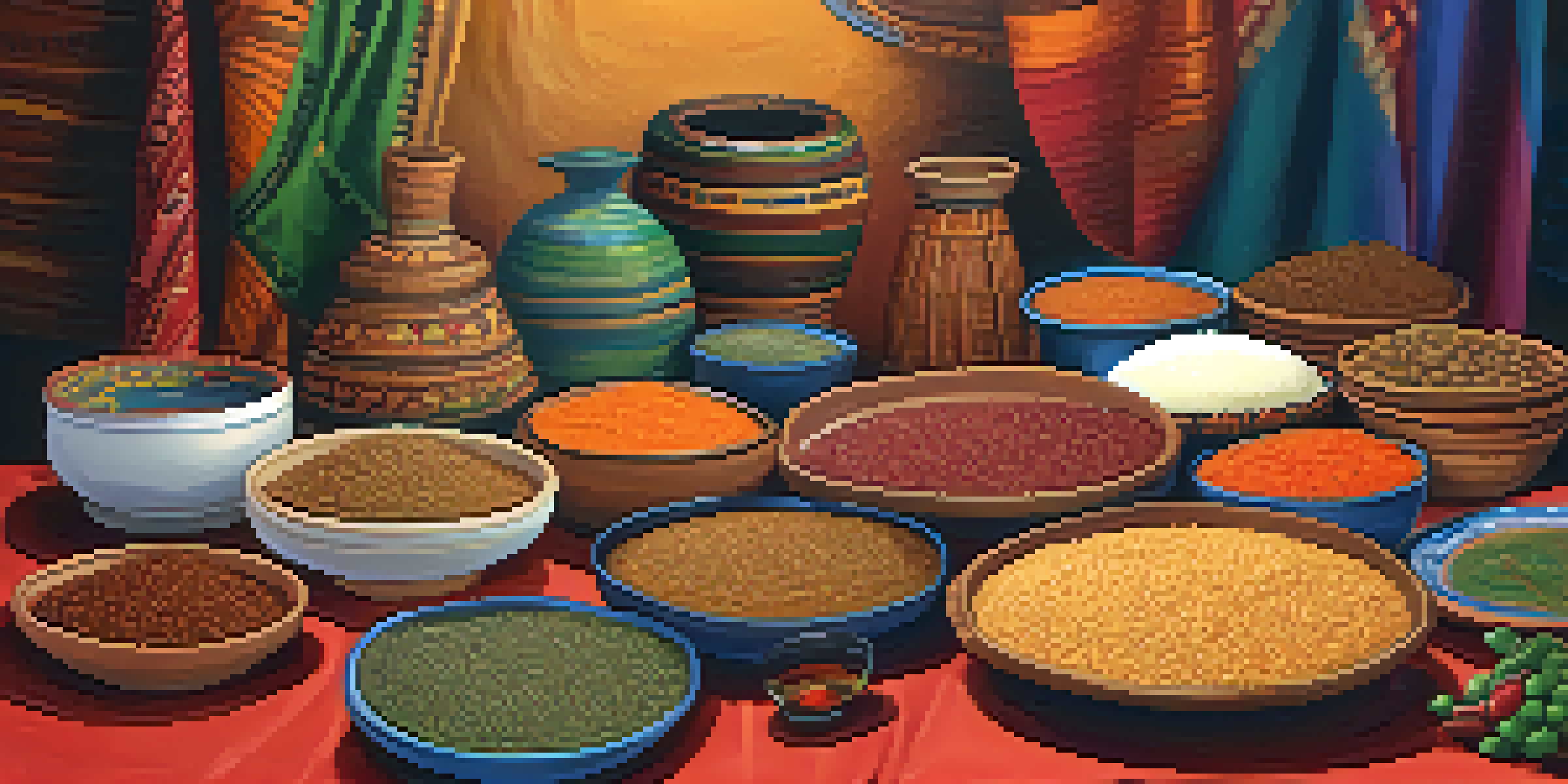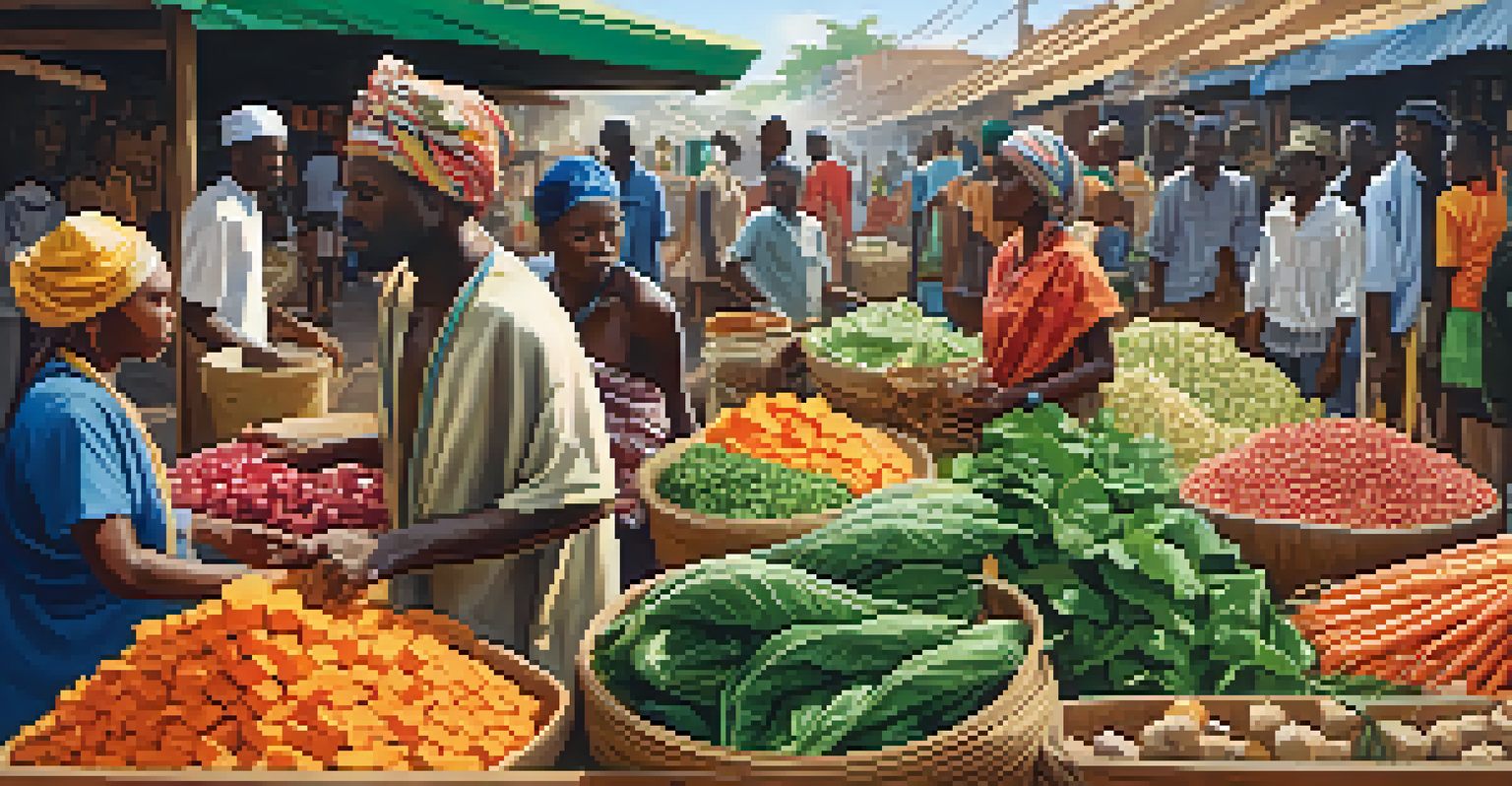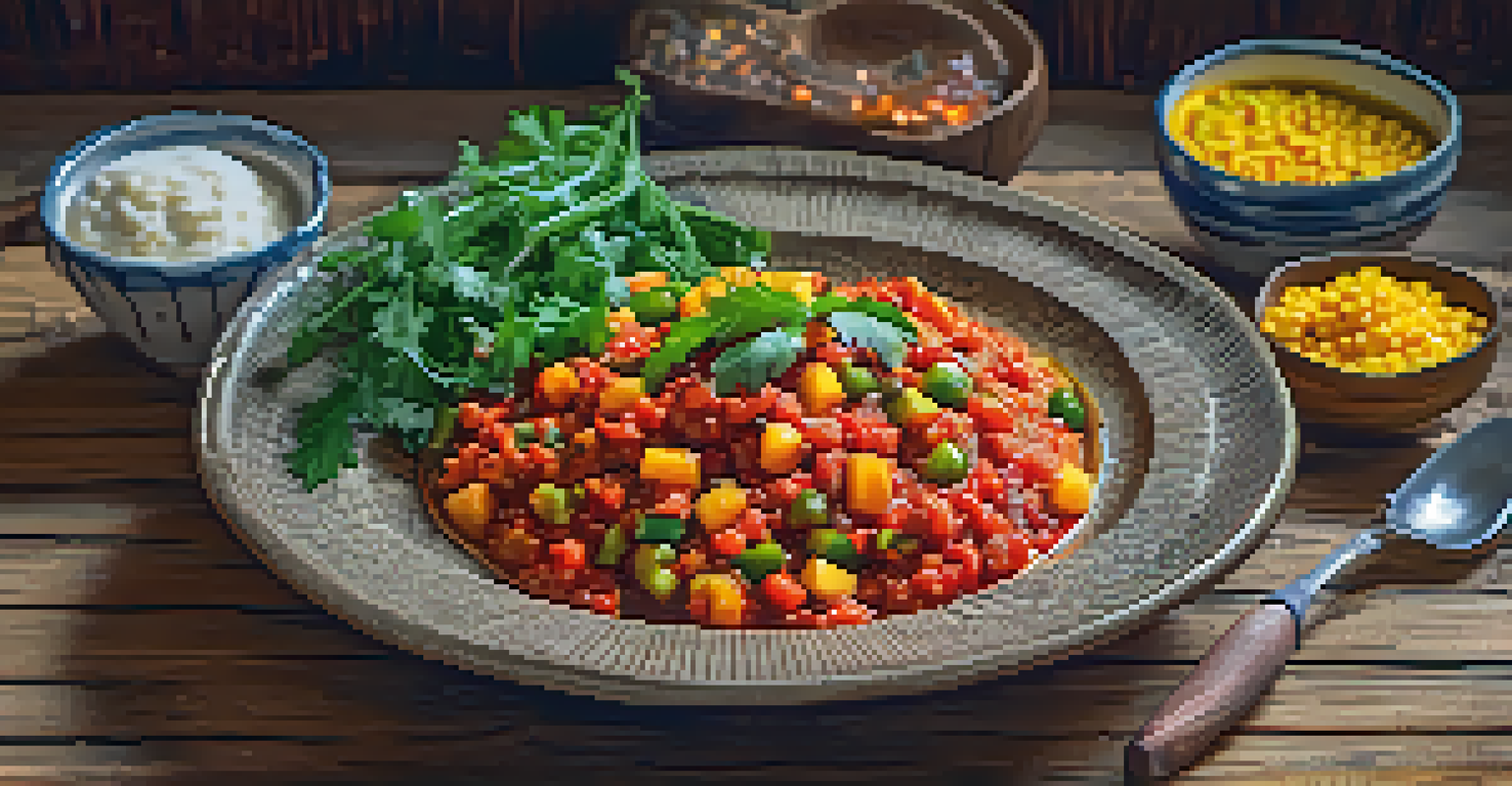Exploring African Cuisine: Vegetarianism and Ethnic Diversity

The Rich Tapestry of African Cuisine
African cuisine is a vibrant mosaic, reflecting the continent's vast diversity in cultures, ingredients, and cooking techniques. Each region boasts its own unique flavors and dishes, influenced by history, geography, and local traditions. From the spicy stews of West Africa to the intricate flavors of North African tagines, there’s a culinary adventure waiting for everyone.
Food is not just what we eat; it’s about who we are and how we connect with one another.
Vegetarianism is woven into this culinary tapestry, often rooted in cultural practices and beliefs. Many communities prioritize plant-based diets due to availability, sustainability, or religious reasons. This emphasis on vegetarianism showcases the creativity and resourcefulness of African cooks, who transform simple ingredients into delightful meals.
As we explore African cuisine, it's essential to appreciate the stories and experiences behind each dish. Every recipe carries a piece of history, family traditions, and a celebration of community, making the act of sharing food a deeply meaningful experience.
Regional Vegetarian Specialties Across Africa
There’s an incredible variety of vegetarian dishes across Africa, each region featuring its own specialties. For instance, in Ethiopia, injera—a sourdough flatbread—often accompanies a colorful array of spicy lentil stews called wot. This communal dining experience highlights how food brings people together, fostering connection and sharing.

In East Africa, dishes like ugali, a maize porridge, serve as a staple alongside vegetables and sauces, showcasing the importance of grains and local produce. Meanwhile, Southern Africa boasts a variety of dishes such as chakalaka, a spicy vegetable relish that’s a must-try at any gathering.
Diversity of African Vegetarian Dishes
African cuisine features a rich variety of vegetarian dishes that reflect the continent's cultural and regional diversity.
Exploring these regional specialties not only introduces you to new flavors but also to the rich cultural narratives that accompany each meal. The diversity in vegetarian dishes reflects the adaptability and innovation of African cooks in their quest to create delicious meals from locally sourced ingredients.
The Role of Vegetables in African Diets
Vegetables are a cornerstone of many African diets, celebrated for their nutritional value and versatility. Leafy greens like collard greens and amaranth are common in various dishes, providing essential vitamins and minerals. These vegetables often serve as the base for stews and side dishes, showcasing their importance in everyday meals.
Cooking is like love. It should be entered into with abandon or not at all.
Root vegetables such as yams, cassava, and sweet potatoes are also staples, offering hearty options that can be prepared in countless ways. Whether boiled, mashed, or fried, these ingredients are cherished for their flavor and filling nature, making them ideal for vegetarian dishes.
The emphasis on fresh, seasonal produce fosters a connection to the land and encourages sustainable eating practices. By prioritizing local vegetables, African cooks not only support their communities but also contribute to a healthier planet.
Herbs and Spices: The Heart of African Flavors
Herbs and spices play an integral role in African cuisine, transforming simple ingredients into vibrant dishes. From the aromatic berbere spice blend in Ethiopian cooking to the fragrant coriander used in North African tagines, these flavorings are essential for creating depth and character in vegetarian meals. They also highlight the region's agricultural diversity.
Many traditional African cooking methods involve marinating vegetables in spice blends, allowing flavors to meld beautifully. This technique not only enhances the taste but also encourages the use of various herbs, often grown in home gardens or sourced from local markets.
Herbs and Spices Define Flavors
Herbs and spices are essential in African cooking, enhancing the flavors of vegetarian meals and showcasing the region's agricultural richness.
By exploring these flavors, you can appreciate the artistry behind African cooking. Each spice tells a story, reflecting the heritage and traditions of the people who cultivate and use them, making every meal a celebration of culture.
Influence of Religion on Vegetarian Practices
Religion significantly influences dietary choices across Africa, with various faiths promoting vegetarianism or specific dietary restrictions. For example, among some communities in Ethiopia, the Orthodox Christian tradition includes fasting periods where meat is avoided, leading to a rich array of vegetarian dishes during these times. This practice has resulted in a diverse culinary landscape that celebrates plant-based foods.
Similarly, in certain Muslim communities, the concept of halal extends beyond meat to encompass a broader emphasis on wholesome, vegetarian options. This focus encourages families to explore various plant-based dishes, often featuring lentils, beans, and vegetables as key ingredients.
Understanding these religious influences provides deeper insights into African cuisine and its vegetarian offerings. It highlights how beliefs shape cooking practices, creating a unique blend of flavors and traditions that honor both spirituality and community.
Modern Vegetarian Trends in African Cuisine
As global trends shift towards plant-based diets, African cuisine is also experiencing a modern transformation. Chefs and home cooks alike are reimagining traditional dishes, incorporating innovative twists that appeal to contemporary palates. This evolution showcases the adaptability of African cuisine while honoring its roots.
Restaurants specializing in African vegetarian fare are emerging in urban areas, offering diners unique experiences that celebrate the continent's culinary diversity. These establishments often emphasize locally sourced ingredients, reflecting a growing commitment to sustainability and health.
Community and Connection Through Food
In African cultures, sharing meals fosters community bonds and preserves culinary traditions, making dining a deeply meaningful experience.
Social media platforms are also playing a pivotal role in promoting African vegetarian dishes, with food bloggers and influencers sharing recipes that inspire others to explore this delicious cuisine. This digital presence is helping to spark interest and appreciation for the incredible variety of vegetarian options available across Africa.
Savoring the Experience: Eating Together
In many African cultures, food is more than just sustenance; it’s a way of building community and sharing experiences. Meals are often communal affairs, with dishes served family-style, encouraging everyone to partake and connect. This communal aspect highlights the importance of togetherness and hospitality in African dining traditions.
Sharing a meal often involves storytelling, laughter, and the passing down of recipes from one generation to the next. This exchange fosters a sense of belonging and keeps cultural traditions alive, ensuring that the rich tapestry of African cuisine continues to thrive.

As you explore African vegetarian dishes, take the time to appreciate the stories behind them. Whether dining with friends, family, or new acquaintances, savoring these meals together creates lasting memories and deepens your appreciation for the diverse culinary heritage of Africa.